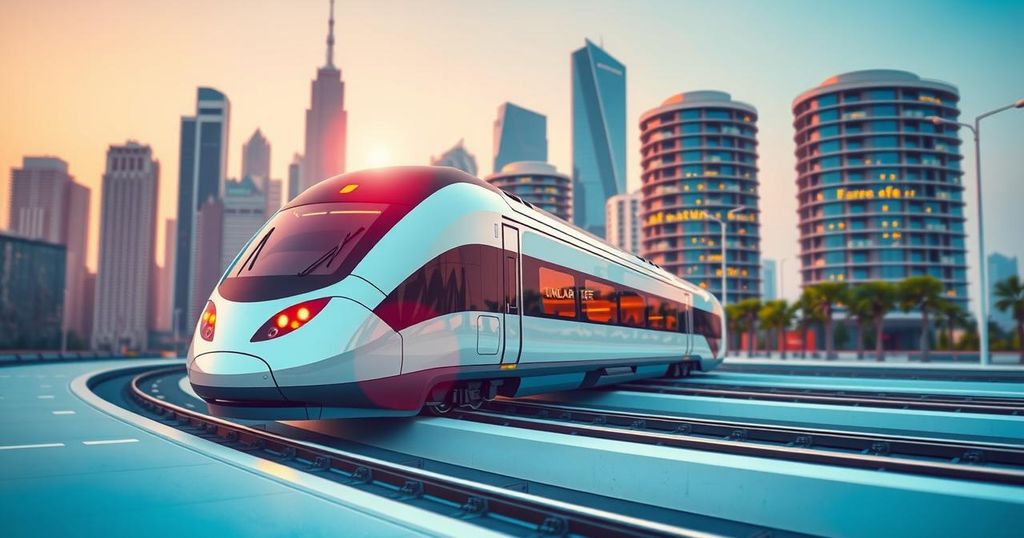Cars
AFRICA, AUTOMOTIVE INDUSTRY, CASABLANCA, EGYPT, ENERGY, EUROPE, HYUNDAI ROTEM, INTERNATIONAL TRADE, INVESTMENTS, KORAIL, KOREA, KOREA RAILROAD CORPORATION, LOS ANGELES, METRO, MINISTRY OF LAND, INFRASTRUCTURE AND TRANSPORT, MOROCCAN NATIONAL RAILWAYS OFFICE, MOROCCO, NIF, NORTH AMERICA, PARK SANG - WOO, PORTUGAL, QUEENSLAND, SPAIN, SUPPLY CHAIN, TANZANIA, TRADE, TUNISIA, UNITED STATES
Ethan Kim
0 Comments
Hyundai Rotem Secures Record $1.5 Billion Train Order in Morocco
Hyundai Rotem has secured a historic 2.2 trillion won ($1.5 billion) contract with Morocco to supply double decker trains for improved public transportation ahead of the 2030 World Cup. This marks the company’s largest deal, indicating a strong entry into the Moroccan railway market and a collaborative effort between public and private sectors in South Korea.
Hyundai Rotem has secured a landmark contract valued at 2.2 trillion won (approximately $1.5 billion) with the Moroccan National Railways Office, marking the largest single deal in the company’s history. The agreement, finalized on Tuesday, involves supplying double decker trains designed to significantly enhance public transportation in Morocco, especially in light of the nation co-hosting the 2030 World Cup alongside Spain and Portugal.
The newly procured double decker trains will achieve speeds of up to 160 kilometers per hour and facilitate connections between Casablanca and other major regions within Morocco. This initiative is anticipated to contribute to the improvement of the local transportation infrastructure as the country prepares for the global sporting event.
Hyundai Rotem plans to produce some of the train components in Morocco, thus fostering the growth of the local railway sector. The company, alongside Korea Railroad Corporation (Korail), is positioned to manage maintenance and repair services through forthcoming negotiations with Moroccan officials.
In addition to enhancing the Moroccan rail landscape, this agreement is projected to stimulate smaller Korean firms within the railway industry, as roughly 90 percent of the train components are sourced from South Korea’s small- and medium-sized enterprises. This collaboration is seen as a strategic advancement for Hyundai Rotem’s entry into the Moroccan market.
This successful endeavor is attributed to the joint efforts of public and private sectors, including support from the Ministry of Land, Infrastructure, and Transport and Korail, which facilitated competition against European bidders. Notably, Transport Minister Park Sang-woo previously engaged with local authorities in Morocco to underscore the competitiveness of Korea’s railway offerings. Moreover, Korail’s commitment to technology transfer and training received favorable feedback from Moroccan stakeholders.
This contract positions Hyundai Rotem to further its market presence across Africa, building upon prior projects in countries such as Tunisia, Tanzania, and Egypt. Previous notable contracts include significant projects in Australia and partnerships in providing rail services for the Los Angeles Metro.
Hyundai Rotem officials emphasized the collective achievement of this order, stating, “The secured order is a case that was achieved through ‘One Team Korea’ bringing the public and private sectors together, acknowledging the Korean railway’s competitiveness in the global market.” They reaffirmed their commitment to delivering high-quality trains for both Moroccan citizens and visitors attending the 2030 World Cup.
In summary, Hyundai Rotem’s acquisition of a significant train order in Morocco not only represents a milestone for the company but also underscores the potential for enhanced public transportation in the region. This contract reflects a robust collaboration between Korean public and private sectors and is expected to foster growth in the local railway industry. The deal paves the way for future partnerships and the expansion of Hyundai Rotem in the African market.
Original Source: www.koreaherald.com




Post Comment